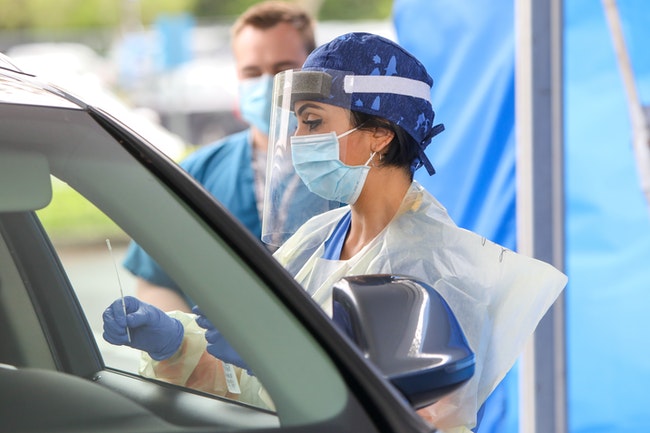 Andrea Davila, a nurse at the Kaiser Permanente North Lancaster clinic administers a test for COVID-19 at the clinic’s drive-thru testing site on Wednesday, April 29. (Amanda Loman/Salem Reporter)
Andrea Davila, a nurse at the Kaiser Permanente North Lancaster clinic administers a test for COVID-19 at the clinic’s drive-thru testing site on Wednesday, April 29. (Amanda Loman/Salem Reporter)
Birthday parties, graduation celebrations and other private social gatherings are behind much of the recent spread of Covid across Oregon, and health officials fear Fourth of July weekend could lead to a large spike in new infections as the state experiences a record numbers of Covid diagnoses.
“We really need people to work with us on this,” said Dr. Paul Cieslak, public health physician with Oregon Health Authority, in a news conference Thursday. He urged Oregonians to cancel plans for multi-family gatherings and trips far from home, especially for indoor events where people are in prolonged close contact.
“We cannot attribute this recent increase to an increase in testing. It’s a real increase in cases,” he said.
When the virus spreads at small gatherings, Cieslak said it’s easier for Covid to become more widespread across a community, increasing overall transmission between unrelated people.
The warning comes after Gov. Kate Brown said Monday she would consider ordering some businesses to close if Oregonians can’t slow the spread of the virus.
On Thursday, Oregon saw 375 people diagnosed with Covid, the largest increase in a single day.
Marion County, an early hotspot for Covid, is faring somewhat better than the rest of the state. The county added 25 cases Thursday, for a total of 1,569. Polk County added none.
Cieslak said new cases in Oregon are increasingly in rural counties and among young people. The state hasn’t seen an increase in hospitalizations or the death rate from the virus, he said, but noted those numbers are slower to rise because it can take time after someone falls sick for their illness to become serious.
Cieslak urged young people, who are less likely to get seriously ill, to consider they may infect others who are more vulnerable.
“Even if you’re young and you yourself are unlikely to die from Covid, I would guess you don’t want to be part of that chain of transmission that eventually takes the virus to an elderly person or a person with a lot of chronic underlying conditions,” he said.
He said if people won’t cancel plans to gather, limiting the size of gatherings, keeping people outside, wearing masks, not sharing food or drinks and remaining six feet apart would help.
Marion County is currently meeting all of the health authority’s indicators for tracking the severity of the virus. The percentage of Covid tests that are positive has decreased slightly in the past week, according to new state data released Thursday, and hospitalizations are also down. Health workers are following up on nearly every new case within a day – a key to identifying other potential infected people who are then urged to quarantine.
The health authority doesn’t have any reported Marion County outbreaks tied to large social gatherings over the past week, said spokesman Phil Schmidt, but he noted there is often “a substantial delay” in determining someone got sick at a social gathering and tracing their case to others.
Jenna Wyatt, county health department spokeswoman, echoed Cielak’s caution that those events are prime ways to spread Covid.
Over the past week, the county was able to trace 71% of new Covid cases to another person known to be infected, just over the state goal of at least 70%.
DATA: Oregon Health Authority Covid dashboard
Statewide, only 57% of cases can be traced to another person. A lower percentage of cases traced to a source suggests the virus is more widespread in the community, outpacing health workers’ ability to track it.
Polk County is still struggling to connect cases, with 78% of newly-reported cases not traced to another source.
Kristty Polanco, Polk County health administrator, said that number is high because the state sometimes gathers its weekly data as health workers are still trying to establish links, and because some people have refused to talk to contact tracers or share information about their recent movements.
SUPPORT ESSENTIAL REPORTING FOR SALEM – A subscription starts at $5 a month for around-the-clock access to stories and email alerts sent directly to you. Your support matters. Go HERE.
Contact reporter Rachel Alexander: [email protected] or 503-575-1241.

Rachel Alexander is Salem Reporter’s managing editor. She joined Salem Reporter when it was founded in 2018 and covers city news, education, nonprofits and a little bit of everything else. She’s been a journalist in Oregon and Washington for a decade. Outside of work, she’s a skater and board member with Salem’s Cherry City Roller Derby and can often be found with her nose buried in a book.









